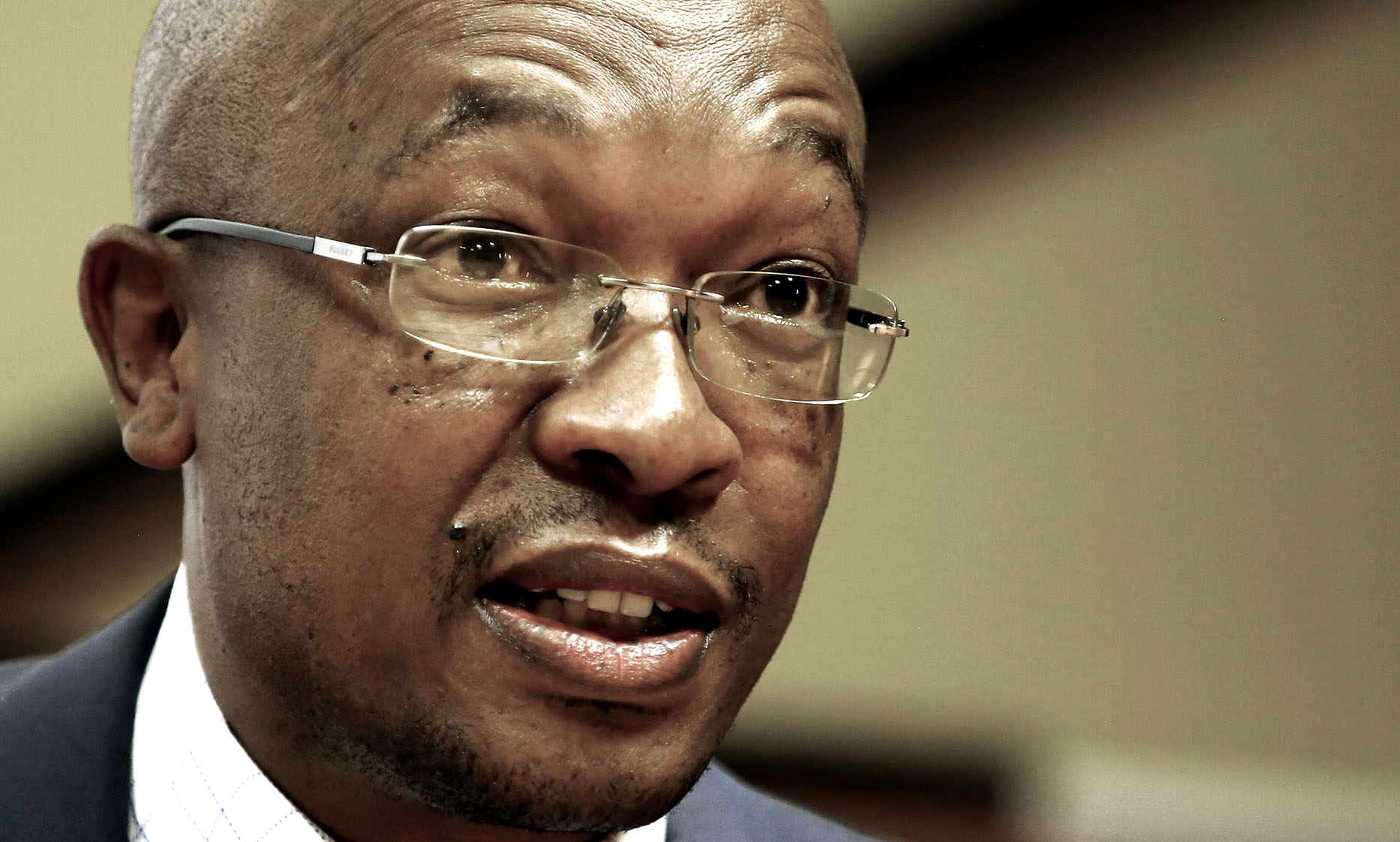Minister of Trade, Industry and Competition Parks Tau says he is “cautiously optimistic” that South Africa and the US will strike a trade deal, more than a month after US President Donald Trump imposed 30% tariffs on South African exports.
“In the nature of negotiations these are tough discussions, so it’s very difficult to anticipate what the outcome would be. But I am optimistic because there’s a sense that we’d want to [reach] an agreement – that we’d want to find each other – and that, I think, is a very good starting point,” Tau told Daily Maverick during an interview in New York on Sunday, 21 September.
Read more: Trump’s tariffs are the final nail in the coffin of SA’s manufacturing industry
Tau met US Trade Representative (USTR) Jamieson Greer and members of Congress in Washington last week following “intensive” three-day discussions by senior officials, his office said on Friday, 19 September.
The Department of Trade, Industry and Competition (DTIC) said the minister held a “cordial and constructive meeting” with Greer on “matters of mutual interest”.
Tau confirmed to Daily Maverick that his engagement with Greer “was primarily about hatching a trade deal, or at least an agreement on which basis we’ll be able to resolve the issues around trade tariffs with the United States.
“I’m quite optimistic,” Tau said about the engagements with the US representatives. “I think, for me, the past week has been quite encouraging, to the extent that we’re now getting into the detail and the general mood was positive in our engagements. In many ways, [we are] cautiously optimistic, because it is when you get to the detail that the issues matter most.”
[US]
I held constructive talks with the US Trade Representative, Amb. Greer on our way forward on SA-US Trade relations. Our teams have been in intense negotiations and I will be briefing President Ramaphosa on the outcomes in due course.#UNGA80 pic.twitter.com/LHL9DmHglO
— Parks Tau (@TauParks) September 19, 2025
Pretoria proffered a proposed framework deal to the US Trade Representative in Washington in May, before President Cyril Ramaphosa and Trump’s meeting in the White House. It was later told by the US that it needed to revise this proposal, in accordance with the Trump administration’s new template for US trade with sub-Saharan Africa.
A revised trade proposal, which offered easier market access for American blueberries, poultry and pork, was submitted to the US on 12 August.
“We presented a subsequent document, and the US had said that they would give us a reply and a document on their side. They’ve given us a document,” Tau told Daily Maverick.
“We’re now working on the basis – if you like – of a template that has been developed by the US, so we are working on the text that they have provided. We’ve given them an initial offer, but now we’re working on the basis of the text they’ve provided, and that’s the basis on which the engagements would happen.
“We’ve had the opportunity over the past three weeks to engage with the document; to consult other departments [and] stakeholders. Our teams, together with that of the USTR, met over intense discussions on Tuesday, Wednesday and Thursday morning [last week] to look at the text [and] to look at getting clarity over specific issues in the text.
“We subsequently agreed that the US would provide us with a revised text based on some of the issues that we raised, and we anticipate that would arrive early in the next week and we would be able to then give a formal response – on which basis there would be negotiations and engagements,” Tau continued.
Read more: Team SA ‘on the ground’ in US, says Ramaphosa, warning against retaliatory tariffs
Non-disclosure agreements govern the trade talks and Tau did not disclose details of the document on the table. After the DTIC has received the revised text from the US, he said, it would consult with various affected government departments, including Transport, National Treasury, Minerals and Petroleum Resources, Energy and Electricity, and Agriculture, and engage with the National Economic Development and Labour Council.
Once the respective departments have been consulted, the document will be taken to Cabinet for consideration and a formal response will be given to the US, according to Tau.
“The agreement is that as soon as we have given the formal response, we would then be able to pretty much knuckle down and get into the negotiations,” he said.
‘Hot-button issues’
Trump’s 30% tariff on South African goods came into effect on 7 August, after he signed an executive order placing new tariff rates on dozens of countries hours before the 1 August deadline he had set for deals to be made. Some countries received modified tariffs, while South Africa’s remained at 30% proposed by the US earlier this year.
According to a Reuters report, in the days before Trump’s tariffs were implemented, South African officials said Washington had not responded to their trade offers or come to the negotiating table.
Pretoria is confronting a critical moment in its fraught relationship with the US. Since returning to the White House in January, Trump has criticised South Africa’s land redress policies and made false claims of persecution and “race-based discrimination” of South Africa’s white Afrikaner minority.
Last month, Agriculture Minister John Steenhuisen suggested that South Africa might need to address some of Trump’s criticisms, including his opposition to South Africa’s land redistribution and affirmative action policies aimed at redressing apartheid-era racial discrimination, according to a Reuters report.
Asked to what extent these “hot-button issues” that the Trump administration has raised have been part of the trade talks with the US, Tau said: “They are part of the discussion.
“Not necessarily the trade track of negotiations and discussions, but the hot-button issues… have been on the table. Of course, they are not the primary issues in the trade discussions, but they are part of ongoing discussions between us and the US. Even in those areas, the sense is that we’re able to clarify issues, we’re able to engage and find solutions in certain areas, [and] we’re making progress in some of the areas.”
He added: “Yes, they are on the cards, they are being discussed, but they are not the primary issues in the trade discussions.”
New markets
In August, Tau announced that his department would turn to new markets in the Middle East and Asia for South Africa’s fruit and automotive exports and to outrun Trump’s trade war, Daily Maverick’s Ferial Haffajee reported.
According to the minister, market access talks are open in several Asian and Middle Eastern countries, including Japan, India, and Saudi Arabia.
“We’ve been to different parts of the world over the past few weeks.
“We were in Japan as part of the President’s working visit to Japan [in August]. It was quite productive and we’ve had detailed discussions about areas of moving trade forward, and what the opportunities and investments are. We then immediately went to India and the discussions are ongoing with the Indians on the basis of whether we can enter into a trade agreement of some sort. Since then, we’ve mandated our teams to do that.”
Read more: Parks Tau’s ‘Plan A’ turns to new markets to outrun Trump’s trade war
In Saudi Arabia, Tau and his negotiating team had engaged the Saudis on “possible investments and trade opportunities” and “unlocking” certain historical commitments.
“That’s looking quite positive,” he added.
The DTIC has also engaged potential trade partners on the continent, including Algeria and Egypt, according to Tau. The African Continental Free Trade Area, the world’s largest free trade area, is Africa’s ambitious bid for economic integration, Daily Maverick reported.
Tau told Daily Maverick the department had identified areas of collaboration and possible investment opportunities in the automotive, gas, oil and mineral sectors on the continent. “We’re looking at all these markets and essentially unlocking opportunities in different markets.”
The minister will be having discussions with companies and stakeholders looking to tap into the South African market on the sidelines of the United Nations General Assembly this week. DM
Victoria O’Regan is a 2025 Dag Hammarskjöld Journalism Fellow whose reporting on the 80th UN General Assembly and its activities in New York has been sponsored by the Dag Hammarskjöld Fund for Journalists.





 Trade, Industry and Competition Minister Parks Tau. (Photo: Gallo Images / Luba Lesolle)
Trade, Industry and Competition Minister Parks Tau. (Photo: Gallo Images / Luba Lesolle)